University Occupational Therapy Reflection Assignment: Analysis
VerifiedAdded on 2021/06/14
|11
|3079
|219
Report
AI Summary
This reflection assignment details an occupational therapy student's clinical placement experience and a significant breach of patient confidentiality. The student, assigned to a 65-year-old woman with osteoarthritis, inadvertently disclosed sensitive financial information to a colleague, leading to a complaint about a breach of privacy. The assignment uses Gibbs' reflective cycle to analyze the incident, exploring the student's feelings of guilt, shame, and loss of confidence, alongside the evaluation of both the negative and positive aspects of the situation. The analysis delves into the ethical implications of the breach, referencing professional codes of conduct and legal frameworks like the Data Protection Act 1998 and the Human Rights Act, emphasizing the importance of maintaining patient confidentiality to protect their well-being and maintain trust. The assignment concludes with a discussion of alternative actions the student could have taken to avoid the breach and prevent future mistakes, highlighting the need for continuous professional development and adherence to ethical guidelines.
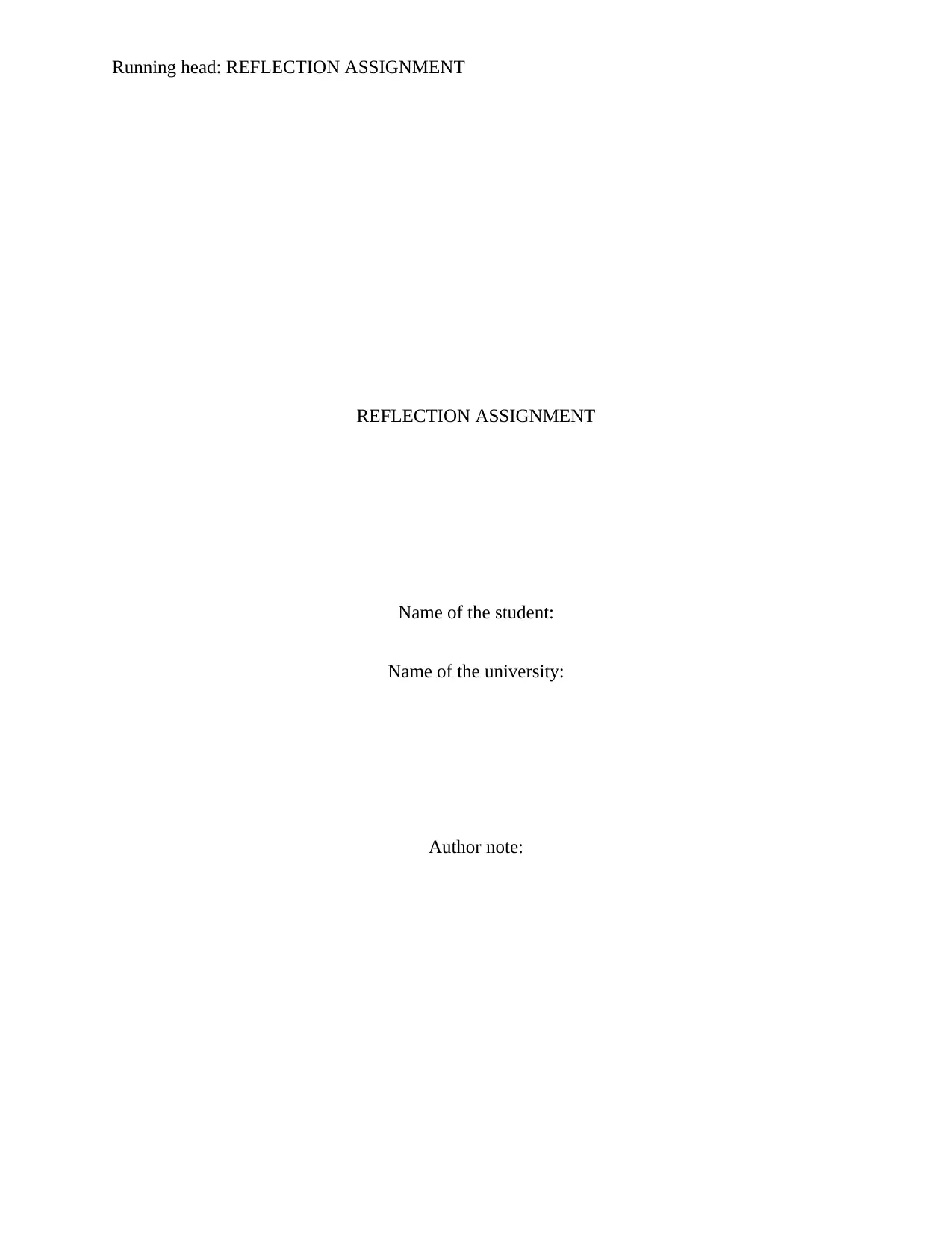
Running head: REFLECTION ASSIGNMENT
REFLECTION ASSIGNMENT
Name of the student:
Name of the university:
Author note:
REFLECTION ASSIGNMENT
Name of the student:
Name of the university:
Author note:
Paraphrase This Document
Need a fresh take? Get an instant paraphrase of this document with our AI Paraphraser
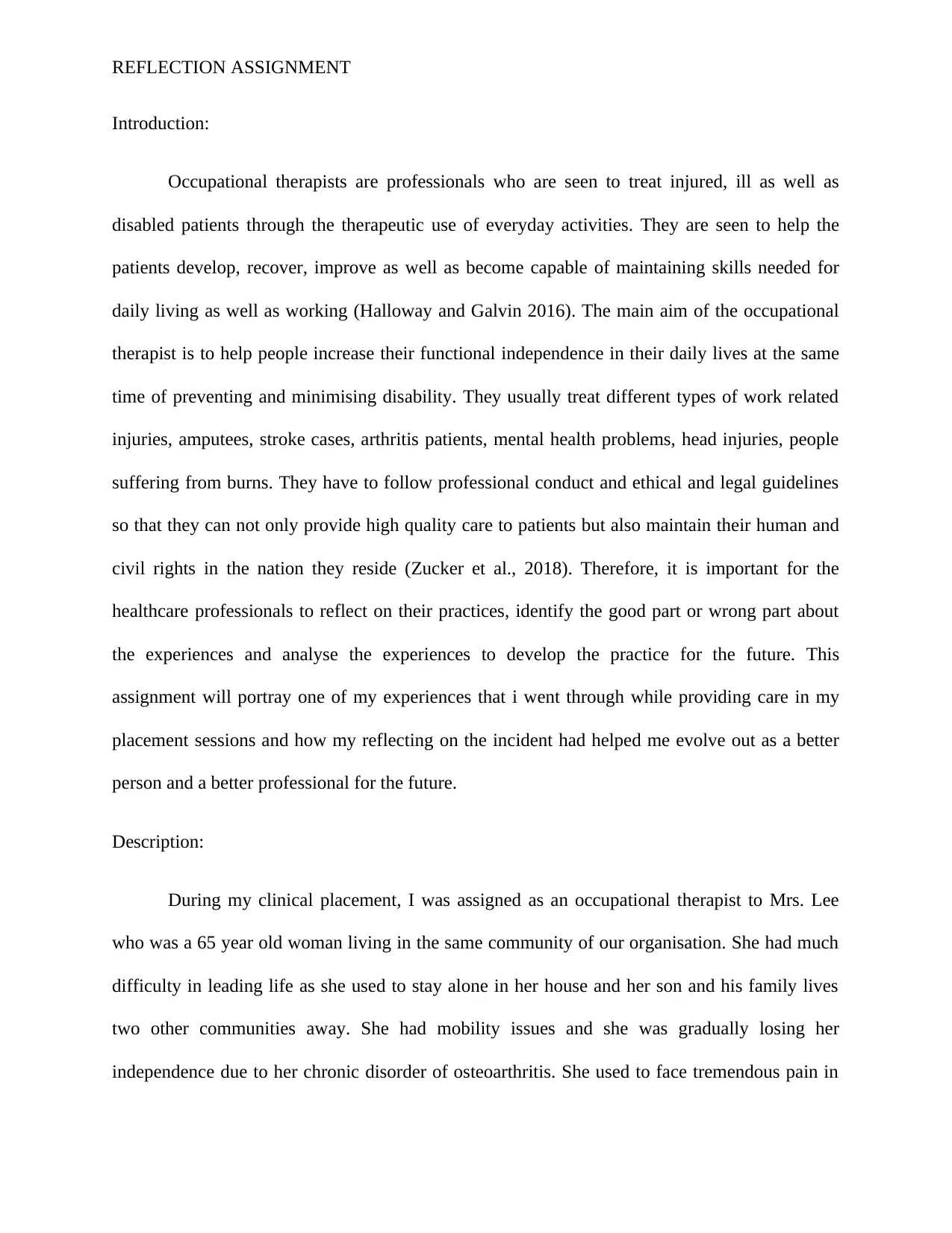
REFLECTION ASSIGNMENT
Introduction:
Occupational therapists are professionals who are seen to treat injured, ill as well as
disabled patients through the therapeutic use of everyday activities. They are seen to help the
patients develop, recover, improve as well as become capable of maintaining skills needed for
daily living as well as working (Halloway and Galvin 2016). The main aim of the occupational
therapist is to help people increase their functional independence in their daily lives at the same
time of preventing and minimising disability. They usually treat different types of work related
injuries, amputees, stroke cases, arthritis patients, mental health problems, head injuries, people
suffering from burns. They have to follow professional conduct and ethical and legal guidelines
so that they can not only provide high quality care to patients but also maintain their human and
civil rights in the nation they reside (Zucker et al., 2018). Therefore, it is important for the
healthcare professionals to reflect on their practices, identify the good part or wrong part about
the experiences and analyse the experiences to develop the practice for the future. This
assignment will portray one of my experiences that i went through while providing care in my
placement sessions and how my reflecting on the incident had helped me evolve out as a better
person and a better professional for the future.
Description:
During my clinical placement, I was assigned as an occupational therapist to Mrs. Lee
who was a 65 year old woman living in the same community of our organisation. She had much
difficulty in leading life as she used to stay alone in her house and her son and his family lives
two other communities away. She had mobility issues and she was gradually losing her
independence due to her chronic disorder of osteoarthritis. She used to face tremendous pain in
Introduction:
Occupational therapists are professionals who are seen to treat injured, ill as well as
disabled patients through the therapeutic use of everyday activities. They are seen to help the
patients develop, recover, improve as well as become capable of maintaining skills needed for
daily living as well as working (Halloway and Galvin 2016). The main aim of the occupational
therapist is to help people increase their functional independence in their daily lives at the same
time of preventing and minimising disability. They usually treat different types of work related
injuries, amputees, stroke cases, arthritis patients, mental health problems, head injuries, people
suffering from burns. They have to follow professional conduct and ethical and legal guidelines
so that they can not only provide high quality care to patients but also maintain their human and
civil rights in the nation they reside (Zucker et al., 2018). Therefore, it is important for the
healthcare professionals to reflect on their practices, identify the good part or wrong part about
the experiences and analyse the experiences to develop the practice for the future. This
assignment will portray one of my experiences that i went through while providing care in my
placement sessions and how my reflecting on the incident had helped me evolve out as a better
person and a better professional for the future.
Description:
During my clinical placement, I was assigned as an occupational therapist to Mrs. Lee
who was a 65 year old woman living in the same community of our organisation. She had much
difficulty in leading life as she used to stay alone in her house and her son and his family lives
two other communities away. She had mobility issues and she was gradually losing her
independence due to her chronic disorder of osteoarthritis. She used to face tremendous pain in
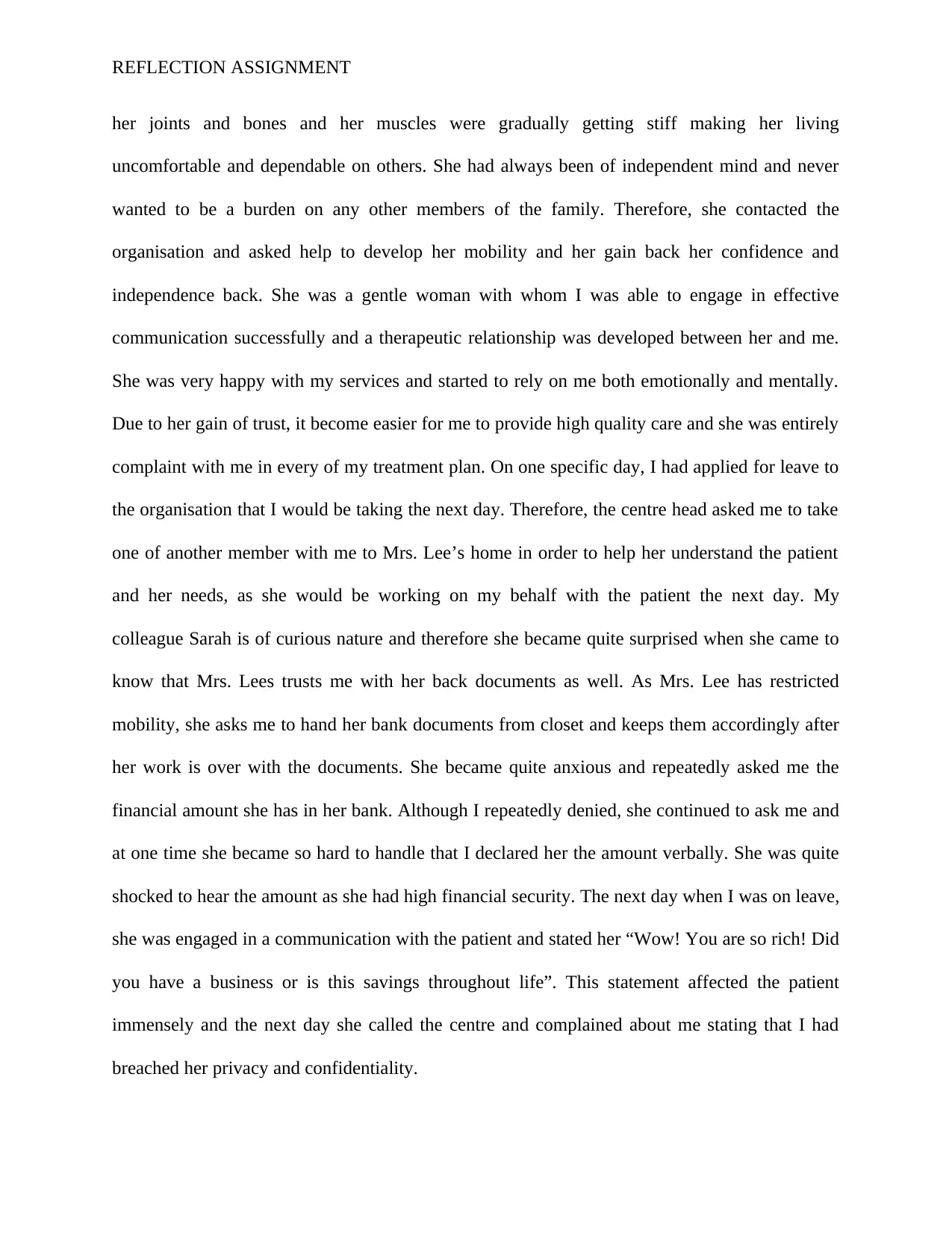
REFLECTION ASSIGNMENT
her joints and bones and her muscles were gradually getting stiff making her living
uncomfortable and dependable on others. She had always been of independent mind and never
wanted to be a burden on any other members of the family. Therefore, she contacted the
organisation and asked help to develop her mobility and her gain back her confidence and
independence back. She was a gentle woman with whom I was able to engage in effective
communication successfully and a therapeutic relationship was developed between her and me.
She was very happy with my services and started to rely on me both emotionally and mentally.
Due to her gain of trust, it become easier for me to provide high quality care and she was entirely
complaint with me in every of my treatment plan. On one specific day, I had applied for leave to
the organisation that I would be taking the next day. Therefore, the centre head asked me to take
one of another member with me to Mrs. Lee’s home in order to help her understand the patient
and her needs, as she would be working on my behalf with the patient the next day. My
colleague Sarah is of curious nature and therefore she became quite surprised when she came to
know that Mrs. Lees trusts me with her back documents as well. As Mrs. Lee has restricted
mobility, she asks me to hand her bank documents from closet and keeps them accordingly after
her work is over with the documents. She became quite anxious and repeatedly asked me the
financial amount she has in her bank. Although I repeatedly denied, she continued to ask me and
at one time she became so hard to handle that I declared her the amount verbally. She was quite
shocked to hear the amount as she had high financial security. The next day when I was on leave,
she was engaged in a communication with the patient and stated her “Wow! You are so rich! Did
you have a business or is this savings throughout life”. This statement affected the patient
immensely and the next day she called the centre and complained about me stating that I had
breached her privacy and confidentiality.
her joints and bones and her muscles were gradually getting stiff making her living
uncomfortable and dependable on others. She had always been of independent mind and never
wanted to be a burden on any other members of the family. Therefore, she contacted the
organisation and asked help to develop her mobility and her gain back her confidence and
independence back. She was a gentle woman with whom I was able to engage in effective
communication successfully and a therapeutic relationship was developed between her and me.
She was very happy with my services and started to rely on me both emotionally and mentally.
Due to her gain of trust, it become easier for me to provide high quality care and she was entirely
complaint with me in every of my treatment plan. On one specific day, I had applied for leave to
the organisation that I would be taking the next day. Therefore, the centre head asked me to take
one of another member with me to Mrs. Lee’s home in order to help her understand the patient
and her needs, as she would be working on my behalf with the patient the next day. My
colleague Sarah is of curious nature and therefore she became quite surprised when she came to
know that Mrs. Lees trusts me with her back documents as well. As Mrs. Lee has restricted
mobility, she asks me to hand her bank documents from closet and keeps them accordingly after
her work is over with the documents. She became quite anxious and repeatedly asked me the
financial amount she has in her bank. Although I repeatedly denied, she continued to ask me and
at one time she became so hard to handle that I declared her the amount verbally. She was quite
shocked to hear the amount as she had high financial security. The next day when I was on leave,
she was engaged in a communication with the patient and stated her “Wow! You are so rich! Did
you have a business or is this savings throughout life”. This statement affected the patient
immensely and the next day she called the centre and complained about me stating that I had
breached her privacy and confidentiality.
⊘ This is a preview!⊘
Do you want full access?
Subscribe today to unlock all pages.

Trusted by 1+ million students worldwide
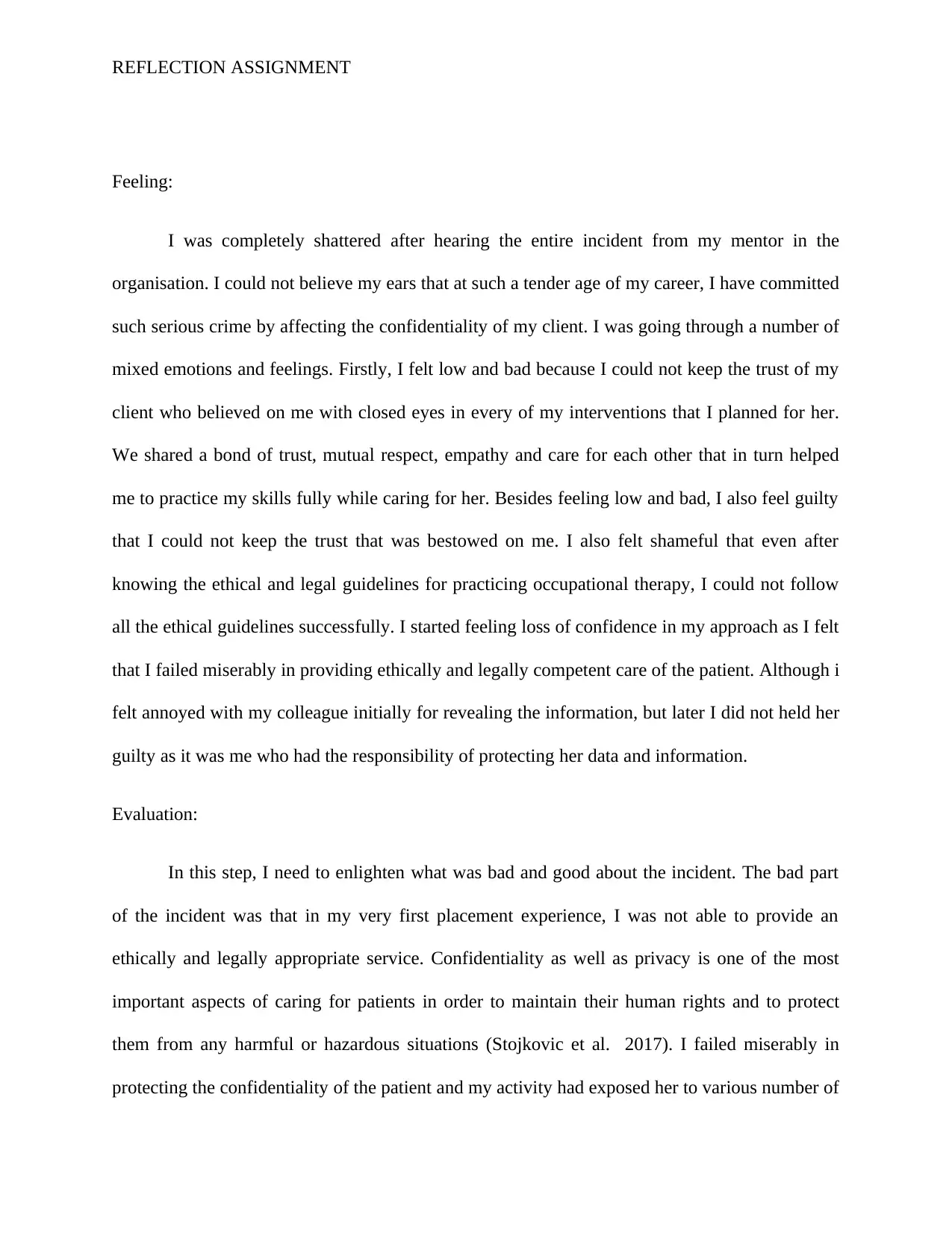
REFLECTION ASSIGNMENT
Feeling:
I was completely shattered after hearing the entire incident from my mentor in the
organisation. I could not believe my ears that at such a tender age of my career, I have committed
such serious crime by affecting the confidentiality of my client. I was going through a number of
mixed emotions and feelings. Firstly, I felt low and bad because I could not keep the trust of my
client who believed on me with closed eyes in every of my interventions that I planned for her.
We shared a bond of trust, mutual respect, empathy and care for each other that in turn helped
me to practice my skills fully while caring for her. Besides feeling low and bad, I also feel guilty
that I could not keep the trust that was bestowed on me. I also felt shameful that even after
knowing the ethical and legal guidelines for practicing occupational therapy, I could not follow
all the ethical guidelines successfully. I started feeling loss of confidence in my approach as I felt
that I failed miserably in providing ethically and legally competent care of the patient. Although i
felt annoyed with my colleague initially for revealing the information, but later I did not held her
guilty as it was me who had the responsibility of protecting her data and information.
Evaluation:
In this step, I need to enlighten what was bad and good about the incident. The bad part
of the incident was that in my very first placement experience, I was not able to provide an
ethically and legally appropriate service. Confidentiality as well as privacy is one of the most
important aspects of caring for patients in order to maintain their human rights and to protect
them from any harmful or hazardous situations (Stojkovic et al. 2017). I failed miserably in
protecting the confidentiality of the patient and my activity had exposed her to various number of
Feeling:
I was completely shattered after hearing the entire incident from my mentor in the
organisation. I could not believe my ears that at such a tender age of my career, I have committed
such serious crime by affecting the confidentiality of my client. I was going through a number of
mixed emotions and feelings. Firstly, I felt low and bad because I could not keep the trust of my
client who believed on me with closed eyes in every of my interventions that I planned for her.
We shared a bond of trust, mutual respect, empathy and care for each other that in turn helped
me to practice my skills fully while caring for her. Besides feeling low and bad, I also feel guilty
that I could not keep the trust that was bestowed on me. I also felt shameful that even after
knowing the ethical and legal guidelines for practicing occupational therapy, I could not follow
all the ethical guidelines successfully. I started feeling loss of confidence in my approach as I felt
that I failed miserably in providing ethically and legally competent care of the patient. Although i
felt annoyed with my colleague initially for revealing the information, but later I did not held her
guilty as it was me who had the responsibility of protecting her data and information.
Evaluation:
In this step, I need to enlighten what was bad and good about the incident. The bad part
of the incident was that in my very first placement experience, I was not able to provide an
ethically and legally appropriate service. Confidentiality as well as privacy is one of the most
important aspects of caring for patients in order to maintain their human rights and to protect
them from any harmful or hazardous situations (Stojkovic et al. 2017). I failed miserably in
protecting the confidentiality of the patient and my activity had exposed her to various number of
Paraphrase This Document
Need a fresh take? Get an instant paraphrase of this document with our AI Paraphraser
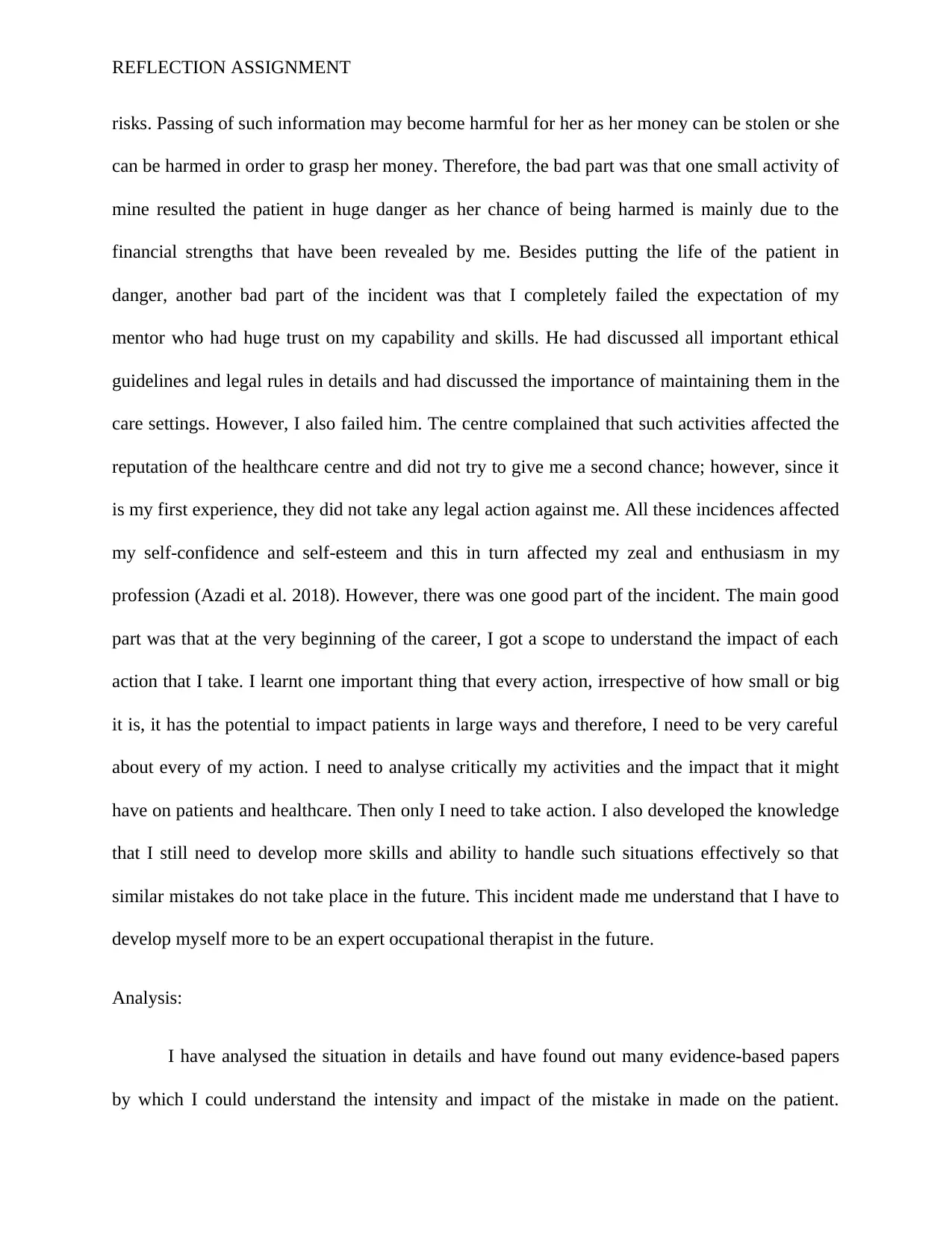
REFLECTION ASSIGNMENT
risks. Passing of such information may become harmful for her as her money can be stolen or she
can be harmed in order to grasp her money. Therefore, the bad part was that one small activity of
mine resulted the patient in huge danger as her chance of being harmed is mainly due to the
financial strengths that have been revealed by me. Besides putting the life of the patient in
danger, another bad part of the incident was that I completely failed the expectation of my
mentor who had huge trust on my capability and skills. He had discussed all important ethical
guidelines and legal rules in details and had discussed the importance of maintaining them in the
care settings. However, I also failed him. The centre complained that such activities affected the
reputation of the healthcare centre and did not try to give me a second chance; however, since it
is my first experience, they did not take any legal action against me. All these incidences affected
my self-confidence and self-esteem and this in turn affected my zeal and enthusiasm in my
profession (Azadi et al. 2018). However, there was one good part of the incident. The main good
part was that at the very beginning of the career, I got a scope to understand the impact of each
action that I take. I learnt one important thing that every action, irrespective of how small or big
it is, it has the potential to impact patients in large ways and therefore, I need to be very careful
about every of my action. I need to analyse critically my activities and the impact that it might
have on patients and healthcare. Then only I need to take action. I also developed the knowledge
that I still need to develop more skills and ability to handle such situations effectively so that
similar mistakes do not take place in the future. This incident made me understand that I have to
develop myself more to be an expert occupational therapist in the future.
Analysis:
I have analysed the situation in details and have found out many evidence-based papers
by which I could understand the intensity and impact of the mistake in made on the patient.
risks. Passing of such information may become harmful for her as her money can be stolen or she
can be harmed in order to grasp her money. Therefore, the bad part was that one small activity of
mine resulted the patient in huge danger as her chance of being harmed is mainly due to the
financial strengths that have been revealed by me. Besides putting the life of the patient in
danger, another bad part of the incident was that I completely failed the expectation of my
mentor who had huge trust on my capability and skills. He had discussed all important ethical
guidelines and legal rules in details and had discussed the importance of maintaining them in the
care settings. However, I also failed him. The centre complained that such activities affected the
reputation of the healthcare centre and did not try to give me a second chance; however, since it
is my first experience, they did not take any legal action against me. All these incidences affected
my self-confidence and self-esteem and this in turn affected my zeal and enthusiasm in my
profession (Azadi et al. 2018). However, there was one good part of the incident. The main good
part was that at the very beginning of the career, I got a scope to understand the impact of each
action that I take. I learnt one important thing that every action, irrespective of how small or big
it is, it has the potential to impact patients in large ways and therefore, I need to be very careful
about every of my action. I need to analyse critically my activities and the impact that it might
have on patients and healthcare. Then only I need to take action. I also developed the knowledge
that I still need to develop more skills and ability to handle such situations effectively so that
similar mistakes do not take place in the future. This incident made me understand that I have to
develop myself more to be an expert occupational therapist in the future.
Analysis:
I have analysed the situation in details and have found out many evidence-based papers
by which I could understand the intensity and impact of the mistake in made on the patient.
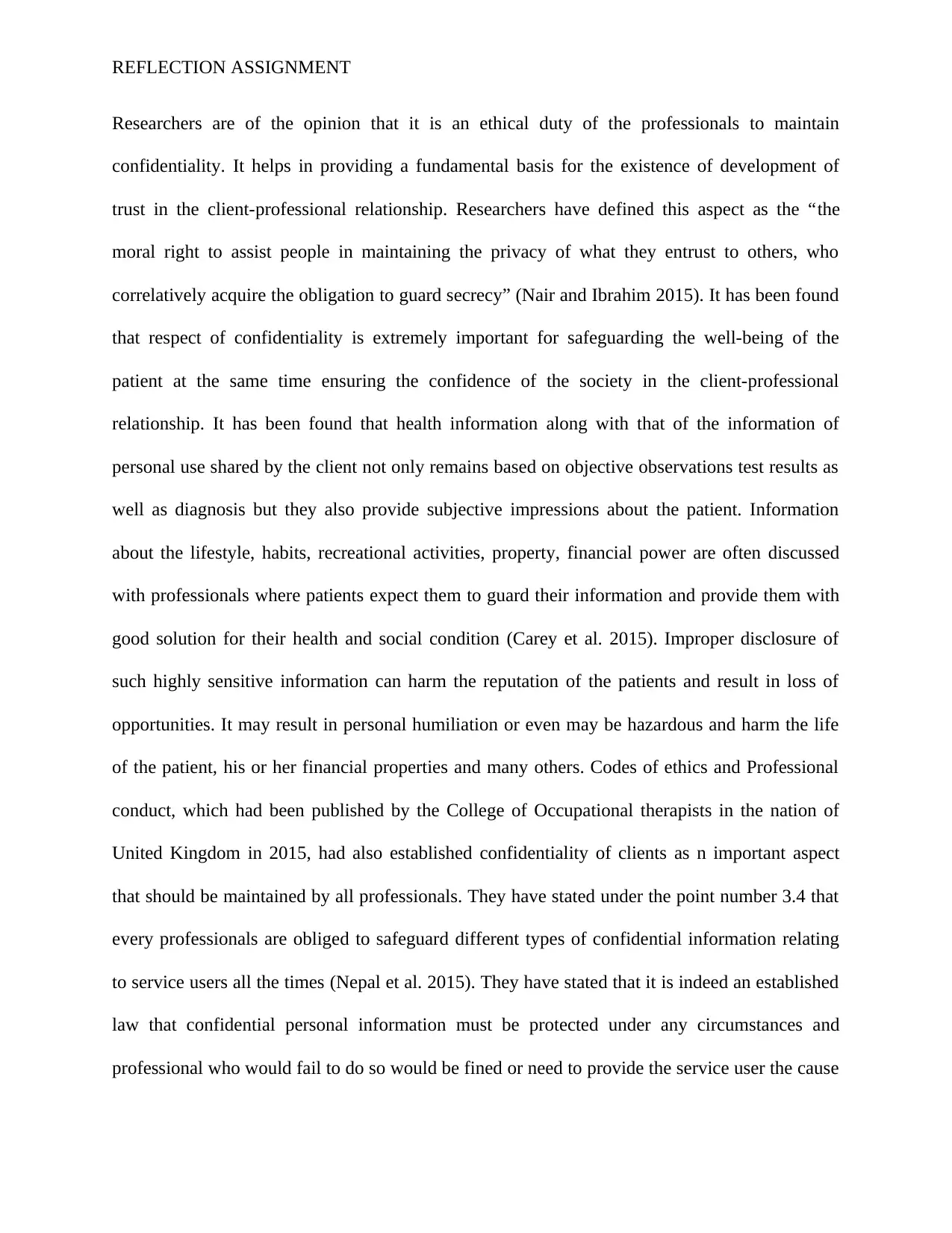
REFLECTION ASSIGNMENT
Researchers are of the opinion that it is an ethical duty of the professionals to maintain
confidentiality. It helps in providing a fundamental basis for the existence of development of
trust in the client-professional relationship. Researchers have defined this aspect as the “the
moral right to assist people in maintaining the privacy of what they entrust to others, who
correlatively acquire the obligation to guard secrecy” (Nair and Ibrahim 2015). It has been found
that respect of confidentiality is extremely important for safeguarding the well-being of the
patient at the same time ensuring the confidence of the society in the client-professional
relationship. It has been found that health information along with that of the information of
personal use shared by the client not only remains based on objective observations test results as
well as diagnosis but they also provide subjective impressions about the patient. Information
about the lifestyle, habits, recreational activities, property, financial power are often discussed
with professionals where patients expect them to guard their information and provide them with
good solution for their health and social condition (Carey et al. 2015). Improper disclosure of
such highly sensitive information can harm the reputation of the patients and result in loss of
opportunities. It may result in personal humiliation or even may be hazardous and harm the life
of the patient, his or her financial properties and many others. Codes of ethics and Professional
conduct, which had been published by the College of Occupational therapists in the nation of
United Kingdom in 2015, had also established confidentiality of clients as n important aspect
that should be maintained by all professionals. They have stated under the point number 3.4 that
every professionals are obliged to safeguard different types of confidential information relating
to service users all the times (Nepal et al. 2015). They have stated that it is indeed an established
law that confidential personal information must be protected under any circumstances and
professional who would fail to do so would be fined or need to provide the service user the cause
Researchers are of the opinion that it is an ethical duty of the professionals to maintain
confidentiality. It helps in providing a fundamental basis for the existence of development of
trust in the client-professional relationship. Researchers have defined this aspect as the “the
moral right to assist people in maintaining the privacy of what they entrust to others, who
correlatively acquire the obligation to guard secrecy” (Nair and Ibrahim 2015). It has been found
that respect of confidentiality is extremely important for safeguarding the well-being of the
patient at the same time ensuring the confidence of the society in the client-professional
relationship. It has been found that health information along with that of the information of
personal use shared by the client not only remains based on objective observations test results as
well as diagnosis but they also provide subjective impressions about the patient. Information
about the lifestyle, habits, recreational activities, property, financial power are often discussed
with professionals where patients expect them to guard their information and provide them with
good solution for their health and social condition (Carey et al. 2015). Improper disclosure of
such highly sensitive information can harm the reputation of the patients and result in loss of
opportunities. It may result in personal humiliation or even may be hazardous and harm the life
of the patient, his or her financial properties and many others. Codes of ethics and Professional
conduct, which had been published by the College of Occupational therapists in the nation of
United Kingdom in 2015, had also established confidentiality of clients as n important aspect
that should be maintained by all professionals. They have stated under the point number 3.4 that
every professionals are obliged to safeguard different types of confidential information relating
to service users all the times (Nepal et al. 2015). They have stated that it is indeed an established
law that confidential personal information must be protected under any circumstances and
professional who would fail to do so would be fined or need to provide the service user the cause
⊘ This is a preview!⊘
Do you want full access?
Subscribe today to unlock all pages.

Trusted by 1+ million students worldwide
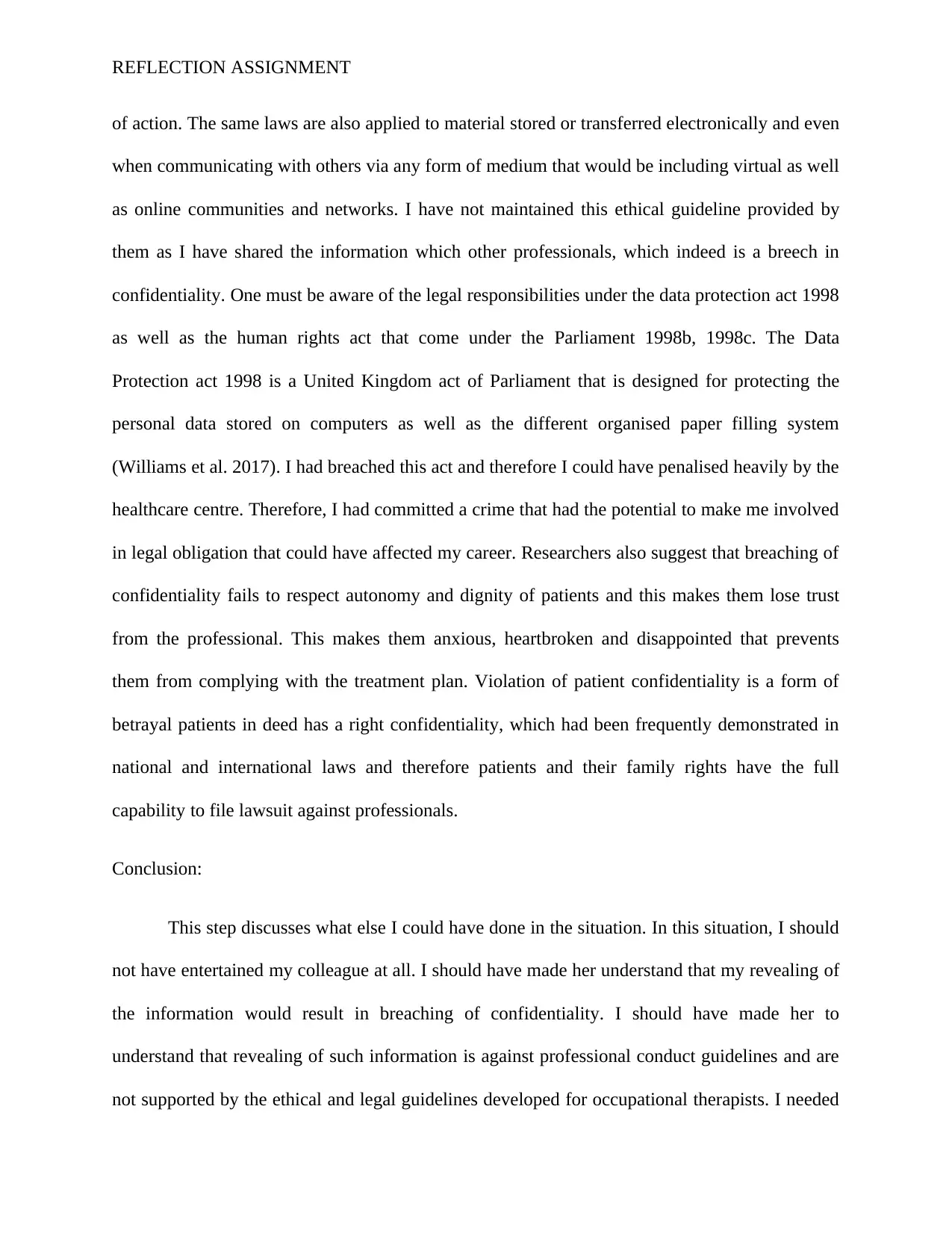
REFLECTION ASSIGNMENT
of action. The same laws are also applied to material stored or transferred electronically and even
when communicating with others via any form of medium that would be including virtual as well
as online communities and networks. I have not maintained this ethical guideline provided by
them as I have shared the information which other professionals, which indeed is a breech in
confidentiality. One must be aware of the legal responsibilities under the data protection act 1998
as well as the human rights act that come under the Parliament 1998b, 1998c. The Data
Protection act 1998 is a United Kingdom act of Parliament that is designed for protecting the
personal data stored on computers as well as the different organised paper filling system
(Williams et al. 2017). I had breached this act and therefore I could have penalised heavily by the
healthcare centre. Therefore, I had committed a crime that had the potential to make me involved
in legal obligation that could have affected my career. Researchers also suggest that breaching of
confidentiality fails to respect autonomy and dignity of patients and this makes them lose trust
from the professional. This makes them anxious, heartbroken and disappointed that prevents
them from complying with the treatment plan. Violation of patient confidentiality is a form of
betrayal patients in deed has a right confidentiality, which had been frequently demonstrated in
national and international laws and therefore patients and their family rights have the full
capability to file lawsuit against professionals.
Conclusion:
This step discusses what else I could have done in the situation. In this situation, I should
not have entertained my colleague at all. I should have made her understand that my revealing of
the information would result in breaching of confidentiality. I should have made her to
understand that revealing of such information is against professional conduct guidelines and are
not supported by the ethical and legal guidelines developed for occupational therapists. I needed
of action. The same laws are also applied to material stored or transferred electronically and even
when communicating with others via any form of medium that would be including virtual as well
as online communities and networks. I have not maintained this ethical guideline provided by
them as I have shared the information which other professionals, which indeed is a breech in
confidentiality. One must be aware of the legal responsibilities under the data protection act 1998
as well as the human rights act that come under the Parliament 1998b, 1998c. The Data
Protection act 1998 is a United Kingdom act of Parliament that is designed for protecting the
personal data stored on computers as well as the different organised paper filling system
(Williams et al. 2017). I had breached this act and therefore I could have penalised heavily by the
healthcare centre. Therefore, I had committed a crime that had the potential to make me involved
in legal obligation that could have affected my career. Researchers also suggest that breaching of
confidentiality fails to respect autonomy and dignity of patients and this makes them lose trust
from the professional. This makes them anxious, heartbroken and disappointed that prevents
them from complying with the treatment plan. Violation of patient confidentiality is a form of
betrayal patients in deed has a right confidentiality, which had been frequently demonstrated in
national and international laws and therefore patients and their family rights have the full
capability to file lawsuit against professionals.
Conclusion:
This step discusses what else I could have done in the situation. In this situation, I should
not have entertained my colleague at all. I should have made her understand that my revealing of
the information would result in breaching of confidentiality. I should have made her to
understand that revealing of such information is against professional conduct guidelines and are
not supported by the ethical and legal guidelines developed for occupational therapists. I needed
Paraphrase This Document
Need a fresh take? Get an instant paraphrase of this document with our AI Paraphraser
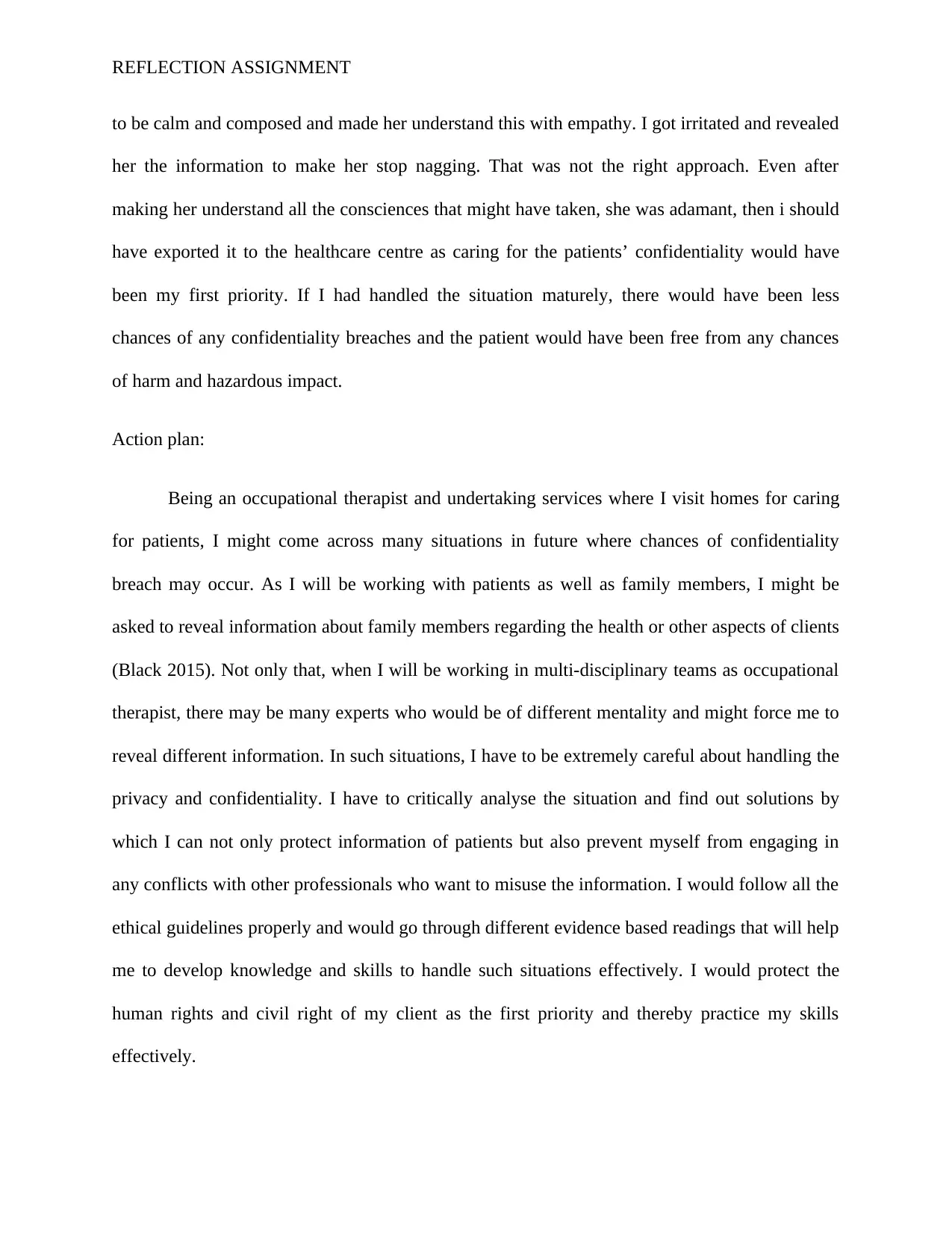
REFLECTION ASSIGNMENT
to be calm and composed and made her understand this with empathy. I got irritated and revealed
her the information to make her stop nagging. That was not the right approach. Even after
making her understand all the consciences that might have taken, she was adamant, then i should
have exported it to the healthcare centre as caring for the patients’ confidentiality would have
been my first priority. If I had handled the situation maturely, there would have been less
chances of any confidentiality breaches and the patient would have been free from any chances
of harm and hazardous impact.
Action plan:
Being an occupational therapist and undertaking services where I visit homes for caring
for patients, I might come across many situations in future where chances of confidentiality
breach may occur. As I will be working with patients as well as family members, I might be
asked to reveal information about family members regarding the health or other aspects of clients
(Black 2015). Not only that, when I will be working in multi-disciplinary teams as occupational
therapist, there may be many experts who would be of different mentality and might force me to
reveal different information. In such situations, I have to be extremely careful about handling the
privacy and confidentiality. I have to critically analyse the situation and find out solutions by
which I can not only protect information of patients but also prevent myself from engaging in
any conflicts with other professionals who want to misuse the information. I would follow all the
ethical guidelines properly and would go through different evidence based readings that will help
me to develop knowledge and skills to handle such situations effectively. I would protect the
human rights and civil right of my client as the first priority and thereby practice my skills
effectively.
to be calm and composed and made her understand this with empathy. I got irritated and revealed
her the information to make her stop nagging. That was not the right approach. Even after
making her understand all the consciences that might have taken, she was adamant, then i should
have exported it to the healthcare centre as caring for the patients’ confidentiality would have
been my first priority. If I had handled the situation maturely, there would have been less
chances of any confidentiality breaches and the patient would have been free from any chances
of harm and hazardous impact.
Action plan:
Being an occupational therapist and undertaking services where I visit homes for caring
for patients, I might come across many situations in future where chances of confidentiality
breach may occur. As I will be working with patients as well as family members, I might be
asked to reveal information about family members regarding the health or other aspects of clients
(Black 2015). Not only that, when I will be working in multi-disciplinary teams as occupational
therapist, there may be many experts who would be of different mentality and might force me to
reveal different information. In such situations, I have to be extremely careful about handling the
privacy and confidentiality. I have to critically analyse the situation and find out solutions by
which I can not only protect information of patients but also prevent myself from engaging in
any conflicts with other professionals who want to misuse the information. I would follow all the
ethical guidelines properly and would go through different evidence based readings that will help
me to develop knowledge and skills to handle such situations effectively. I would protect the
human rights and civil right of my client as the first priority and thereby practice my skills
effectively.
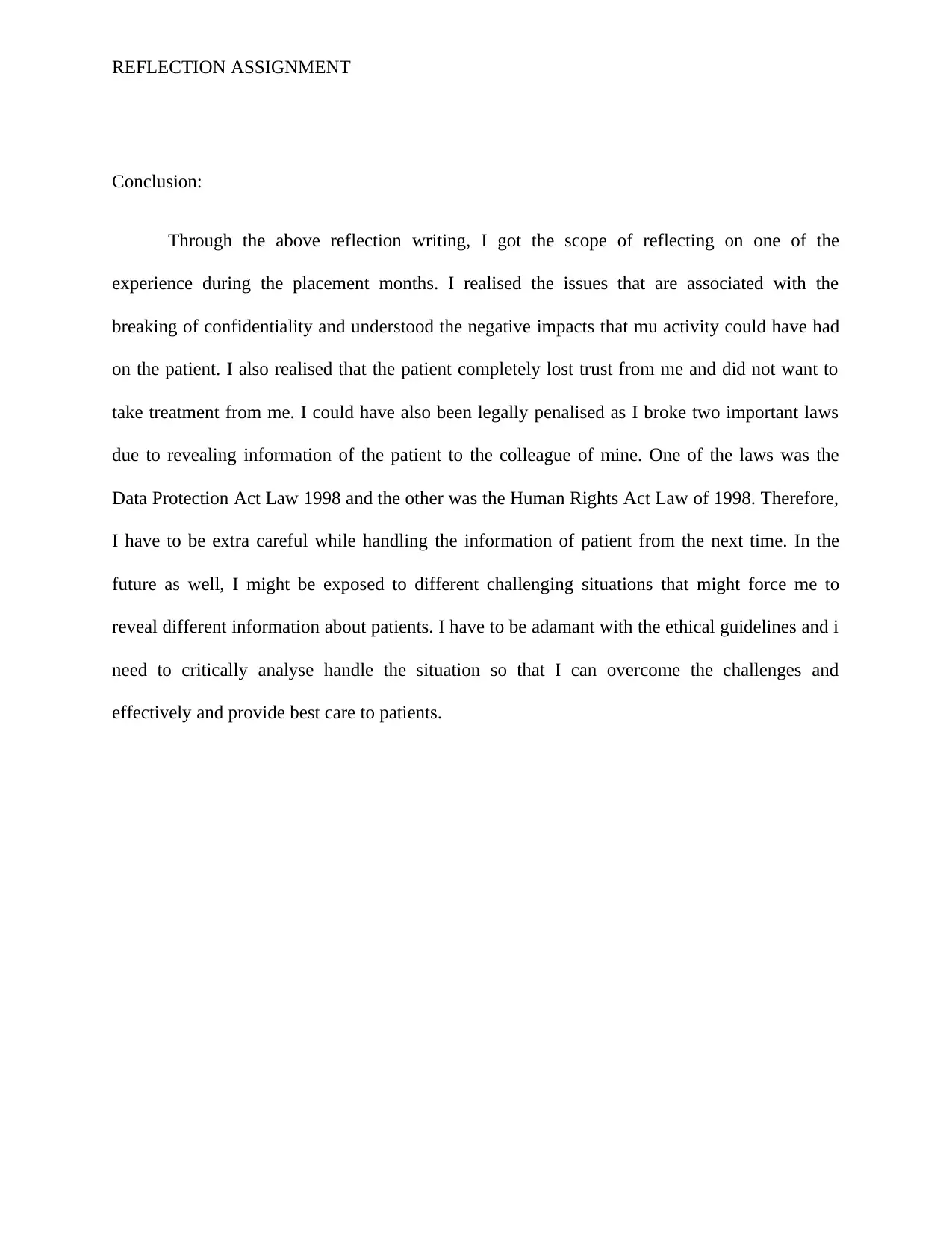
REFLECTION ASSIGNMENT
Conclusion:
Through the above reflection writing, I got the scope of reflecting on one of the
experience during the placement months. I realised the issues that are associated with the
breaking of confidentiality and understood the negative impacts that mu activity could have had
on the patient. I also realised that the patient completely lost trust from me and did not want to
take treatment from me. I could have also been legally penalised as I broke two important laws
due to revealing information of the patient to the colleague of mine. One of the laws was the
Data Protection Act Law 1998 and the other was the Human Rights Act Law of 1998. Therefore,
I have to be extra careful while handling the information of patient from the next time. In the
future as well, I might be exposed to different challenging situations that might force me to
reveal different information about patients. I have to be adamant with the ethical guidelines and i
need to critically analyse handle the situation so that I can overcome the challenges and
effectively and provide best care to patients.
Conclusion:
Through the above reflection writing, I got the scope of reflecting on one of the
experience during the placement months. I realised the issues that are associated with the
breaking of confidentiality and understood the negative impacts that mu activity could have had
on the patient. I also realised that the patient completely lost trust from me and did not want to
take treatment from me. I could have also been legally penalised as I broke two important laws
due to revealing information of the patient to the colleague of mine. One of the laws was the
Data Protection Act Law 1998 and the other was the Human Rights Act Law of 1998. Therefore,
I have to be extra careful while handling the information of patient from the next time. In the
future as well, I might be exposed to different challenging situations that might force me to
reveal different information about patients. I have to be adamant with the ethical guidelines and i
need to critically analyse handle the situation so that I can overcome the challenges and
effectively and provide best care to patients.
⊘ This is a preview!⊘
Do you want full access?
Subscribe today to unlock all pages.

Trusted by 1+ million students worldwide
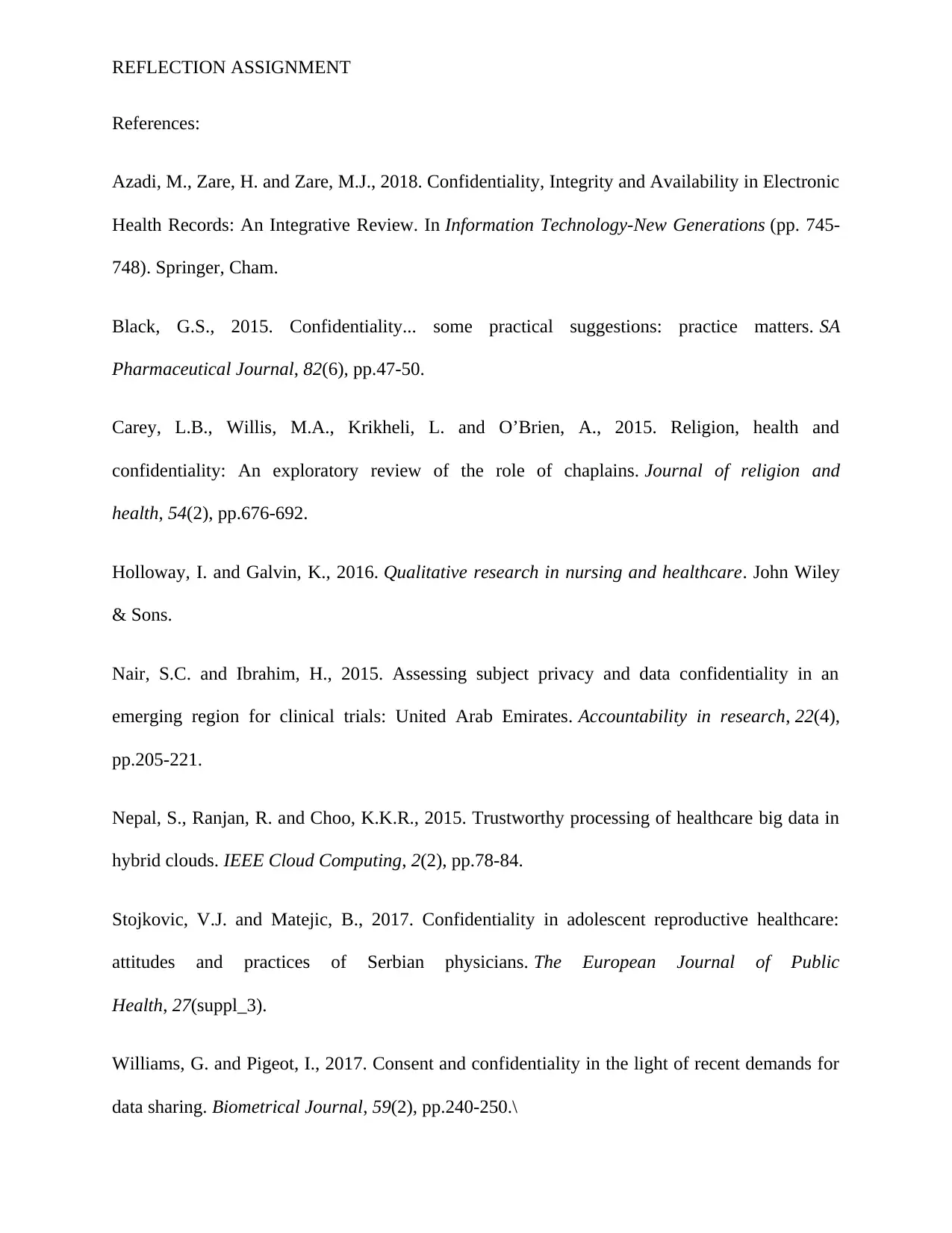
REFLECTION ASSIGNMENT
References:
Azadi, M., Zare, H. and Zare, M.J., 2018. Confidentiality, Integrity and Availability in Electronic
Health Records: An Integrative Review. In Information Technology-New Generations (pp. 745-
748). Springer, Cham.
Black, G.S., 2015. Confidentiality... some practical suggestions: practice matters. SA
Pharmaceutical Journal, 82(6), pp.47-50.
Carey, L.B., Willis, M.A., Krikheli, L. and O’Brien, A., 2015. Religion, health and
confidentiality: An exploratory review of the role of chaplains. Journal of religion and
health, 54(2), pp.676-692.
Holloway, I. and Galvin, K., 2016. Qualitative research in nursing and healthcare. John Wiley
& Sons.
Nair, S.C. and Ibrahim, H., 2015. Assessing subject privacy and data confidentiality in an
emerging region for clinical trials: United Arab Emirates. Accountability in research, 22(4),
pp.205-221.
Nepal, S., Ranjan, R. and Choo, K.K.R., 2015. Trustworthy processing of healthcare big data in
hybrid clouds. IEEE Cloud Computing, 2(2), pp.78-84.
Stojkovic, V.J. and Matejic, B., 2017. Confidentiality in adolescent reproductive healthcare:
attitudes and practices of Serbian physicians. The European Journal of Public
Health, 27(suppl_3).
Williams, G. and Pigeot, I., 2017. Consent and confidentiality in the light of recent demands for
data sharing. Biometrical Journal, 59(2), pp.240-250.\
References:
Azadi, M., Zare, H. and Zare, M.J., 2018. Confidentiality, Integrity and Availability in Electronic
Health Records: An Integrative Review. In Information Technology-New Generations (pp. 745-
748). Springer, Cham.
Black, G.S., 2015. Confidentiality... some practical suggestions: practice matters. SA
Pharmaceutical Journal, 82(6), pp.47-50.
Carey, L.B., Willis, M.A., Krikheli, L. and O’Brien, A., 2015. Religion, health and
confidentiality: An exploratory review of the role of chaplains. Journal of religion and
health, 54(2), pp.676-692.
Holloway, I. and Galvin, K., 2016. Qualitative research in nursing and healthcare. John Wiley
& Sons.
Nair, S.C. and Ibrahim, H., 2015. Assessing subject privacy and data confidentiality in an
emerging region for clinical trials: United Arab Emirates. Accountability in research, 22(4),
pp.205-221.
Nepal, S., Ranjan, R. and Choo, K.K.R., 2015. Trustworthy processing of healthcare big data in
hybrid clouds. IEEE Cloud Computing, 2(2), pp.78-84.
Stojkovic, V.J. and Matejic, B., 2017. Confidentiality in adolescent reproductive healthcare:
attitudes and practices of Serbian physicians. The European Journal of Public
Health, 27(suppl_3).
Williams, G. and Pigeot, I., 2017. Consent and confidentiality in the light of recent demands for
data sharing. Biometrical Journal, 59(2), pp.240-250.\
Paraphrase This Document
Need a fresh take? Get an instant paraphrase of this document with our AI Paraphraser
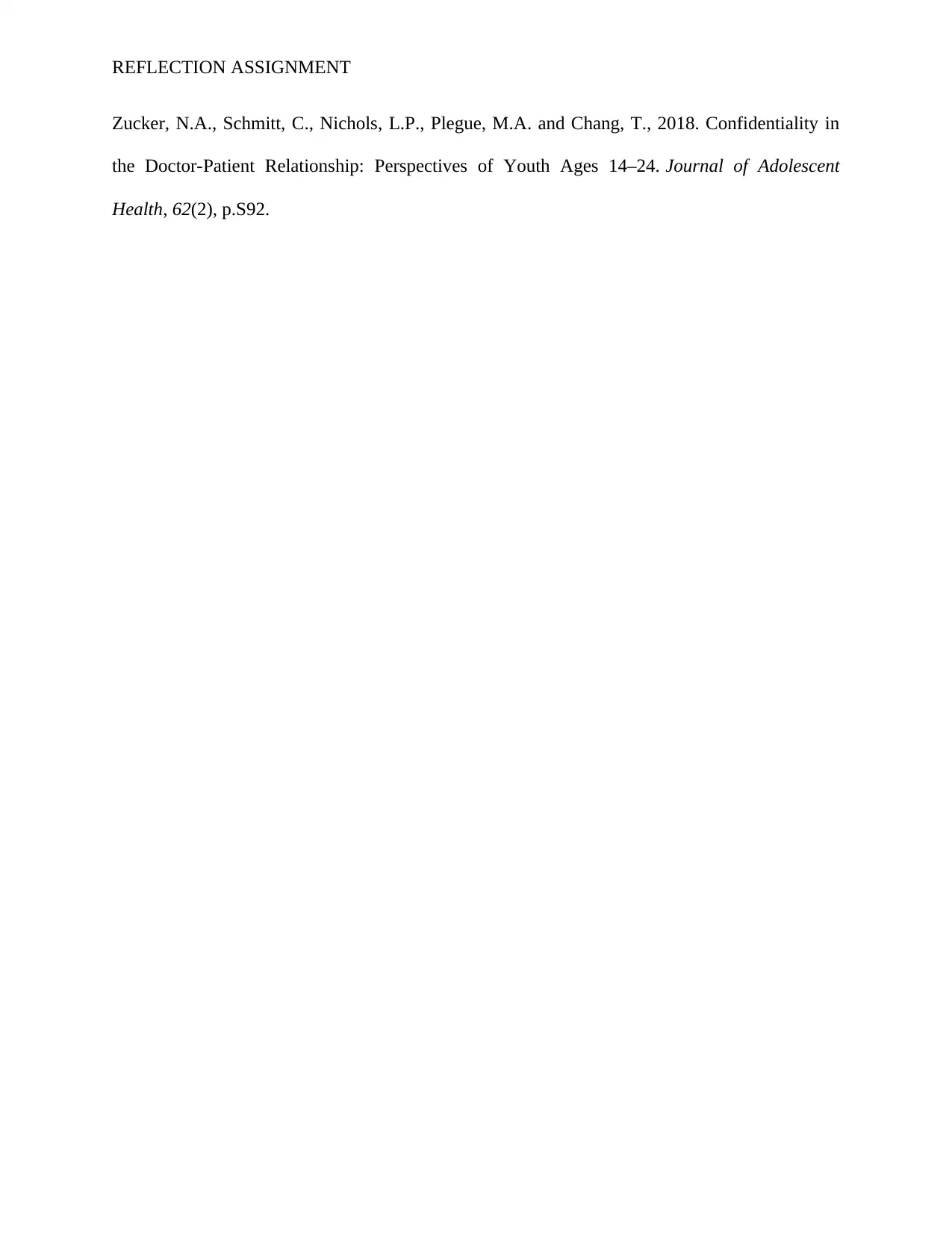
REFLECTION ASSIGNMENT
Zucker, N.A., Schmitt, C., Nichols, L.P., Plegue, M.A. and Chang, T., 2018. Confidentiality in
the Doctor-Patient Relationship: Perspectives of Youth Ages 14–24. Journal of Adolescent
Health, 62(2), p.S92.
Zucker, N.A., Schmitt, C., Nichols, L.P., Plegue, M.A. and Chang, T., 2018. Confidentiality in
the Doctor-Patient Relationship: Perspectives of Youth Ages 14–24. Journal of Adolescent
Health, 62(2), p.S92.
1 out of 11
Related Documents
Your All-in-One AI-Powered Toolkit for Academic Success.
+13062052269
info@desklib.com
Available 24*7 on WhatsApp / Email
![[object Object]](/_next/static/media/star-bottom.7253800d.svg)
Unlock your academic potential
Copyright © 2020–2026 A2Z Services. All Rights Reserved. Developed and managed by ZUCOL.





